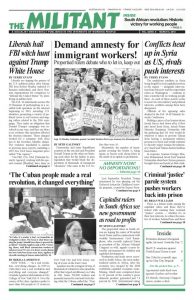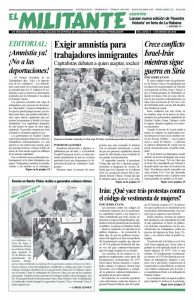The propertied rulers in South Africa are hoping the ouster of President Jacob Zuma and his replacement with wealthy businessman Cyril Ramaphosa, who recently replaced Zuma as president of the African National Congress as well, signals a more favorable environment for stability and capitalist development.
Production and trade never recovered in South Africa, the most industrialized nation in Africa, after the economy was ravaged by the 2008 worldwide capitalist economic crisis. Mining, which once comprised close to 20 percent of the country’s gross domestic product, generated just 7.3 percent by 2016. International rating agencies downgraded the government’s credit rating to junk status in November.
Zuma was forced to resign Feb. 14, after a bitter fight inside the ANC, which has ruled South Africa since the overthrow of the hated apartheid system in a mighty democratic revolution in the early 1990s. Ramaphosa defeated the Zuma-backed candidate for ANC president Dec. 18, leading to replacing Zuma as president of the country.
Ramaphosa was a leader of the struggle against apartheid, like Zuma, and a founder of the National Union of Mineworkers. He became ANC general secretary after Nelson Mandela was freed in 1990 and helped write the nation’s new democratic constitution after apartheid was brought down. In 1996 Ramaphosa resigned his government posts, using his connections and ANC influence to become one of South Africa’s wealthiest businessmen, part of the new layer of Black capitalists.
Ramaphosa’s wealth is estimated at $450 million, with stakes in mining, finance, McDonald’s and Coca-Cola bottling plants.
He was a board member of the Lonmin mining company when 34 miners were cut down in cold blood by cops in 2012 during a strike for higher wages and better working conditions. The day before the miners’ rally was attacked, Ramaphosa called on police to act against what he called the “dastardly criminals.”
The capitalist class hopes that Ramaphosa still has enough authority from his days as an anti-apartheid and labor leader to push through what they call a “reset” in the economy.
Democratic revolution
Half the population in South Africa today is too young to have been part of the democratic revolution that overturned white supremacist rule in South Africa, a revolution that inspired working people across the globe.
For decades the South African government controlled virtually every aspect of the lives of African peoples there. Every individual was assigned a race category — White, Indian (many of them descendants of indentured servants brought to the country), Coloured (of mixed race), and Black.
Black Africans were denied the most basic rights: where to live, who they could live with, the right to change jobs, to own land, to farm, to vote, to protest. A notorious pass system was imposed to control the movement of Blacks.
“The apartheid system had one central and overriding purpose: to organize and perpetuate the superexploitation of African labor by capital,” wrote Jack Barnes, national secretary for the Socialist Workers Party, in a 1985 article titled, “The Coming Revolution in South Africa.”
In 1954 the African National Congress joined with the Indian Congress, the South African Coloured Peoples Organization and the Congress of Democrats — made up of white opponents of apartheid — to organize the Congress of the People.
“South Africa belongs to all who live in it, black and white,” said the Freedom Charter the 3,000 delegates approved. The first four sections were: The people shall govern! All national groups shall have equal rights! The people shall share in the country’s wealth! The land shall be shared among those who work it!
It became the program of a decadeslong struggle waged through strikes, marches and mass disobedience. The struggle received a decisive boost when thousands of internationalist volunteers from revolutionary Cuba helped defeat a series of invasions of neighboring Angola by the South African army, culminating in the 1988 battle of Cuito Cuanavale. The defeat of the apartheid army there punctured the regime’s myth of invincibility. Within two years the apartheid rulers were forced to free Nelson Mandela.
The democratic revolution ended the hated system of white supremacy, guaranteed universal citizenship rights to all who make up the nation and opened space for working people to organize. But many demands of the Freedom Charter have never been carried out and a revolutionary working-class leadership has never developed that could lead the toilers to power.
Capitalist South Africa still unequal
Although post-apartheid governments built millions of homes, extended access to water and electricity, expanded health care, and provided welfare payments to millions of people, class divisions have widened. Millions live in shantytowns. A third of the population has no toilet. Official unemployment is at 26.7 percent and Blacks still make less than a fourth of what whites earn.
The response to Ramaphosa’s election is class-divided. He is hailed by employers and middle-class layers in the Black community, who relate to his story as a successful businessman.
Working people aren’t so sure. Most say they stick with the ANC, but it doesn’t do much for them. “I keep thinking it might change, it might change, let me give him some time,” Dipuo Kalodi, a domestic worker, told the New York Times. “But there’s no change.”
The situation of farmworkers in the Eastern Cape have deteriorated over the last several years, Owen Tapiwa told the Militant by phone from De Doorns Feb. 20. Tapiwa was a participant in strikes by thousands of farmworkers in 2012 and 2013.
“The country is rich,” Tapiwa said. “In some places people are living good and for others it’s like another world. Thousands of farmworkers are living in shacks, nothing is provided to them. They don’t have proper clinics, proper food, electricity.
“We have a leadership, the ANC, but no one is actually fighting for the people,” he said. “Here in De Doorns, the same people in the ANC are the labor brokers, who provide workers to the farm owner.”
As Ramaphosa has taken the leadership of the ANC and the government, the currency has surged and the South Africa Reserve Bank cranked up its growth forecasts.
He has pledged to “engage” with mine owners on new, pro-capitalist laws.
In his Feb. 16 State of the Nation speech, Ramaphosa promised to work to change what he admits is “a highly unequal society, in which poverty and prosperity are still defined by race and gender.” He also called for mine bosses, union leaders and “communities” to work together, code words for speedup, deeper exploitation and higher profits.
On Feb. 20 Finance Minister Malusi Gigaba released the 2018 budget promising “tough measures,” including a higher sales tax that will hit working people hardest. Also on the table are proposals to overturn laws passed after the fall of apartheid that make it harder for bosses to fire workers.

